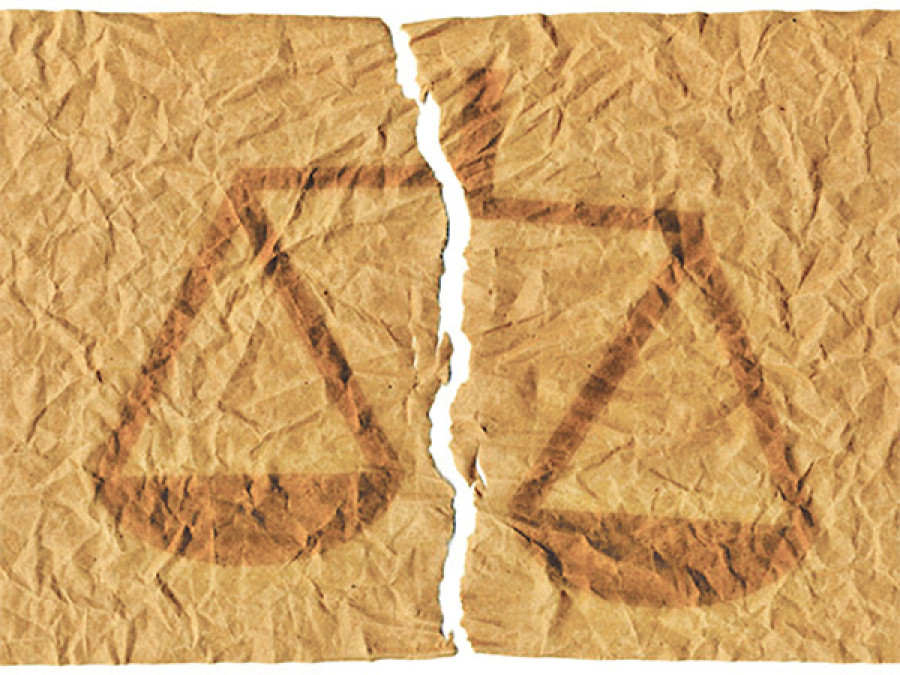Opinion
Commissions and credibility
Transitional justice mechanisms must incorporate obligations to truth, justice, reparations, accountability.
Suman Adhikari
The state has an obligation to conduct effective investigations and establish the right to truth of gross human rights violations, guarantee effective remedy, protect human rights, and adopt necessary measures to ensure justice, reparations, and accountability. All these measures constitute reconciliation. Conflict victims have the right to know the truth about the crimes they suffered, find out what happened to their loved ones, and the reasons behind such crimes. This will help them ascertain whom to grant amnesty to, and on what grounds. Society has to know of the circumstances surrounding gross human rights violations to ensure non-recurrence in the future and a public acknowledgement of conflict victims. Thus, truth commissions are formulated to investigate serious human rights violations in conflict, ensure justice and reparations for victims, punish perpetrators, and ensure non-recurrence.
Dissatisfactions
Transitional justice in Nepal, however, has been never been discussed as a national agenda. It was overshadowed by the integration of former Maoist combatants into the national army and is now sidelined by constitution making. Discussions so far have focussed only on amnesty versus prosecution, pushing back the formation of commissions for years. As transitional justice by temperament is victim centric, the commission process and content of the law should be consultative and participatory, ensuring the ownership of conflict victims. The TRC and CED bill was prepared in consensus by the political parties, with the government tabling the bill in Parliament in March 2014. Conflict victims submitted a memo to the Speaker and all members of Parliament, demanding the bill be ratified as per the Supreme Court verdict of January 2, 2014, but in vain. Victims, hence, have had to go to the Supreme Court once again.
Neither does the current Act have the proper definition of disappearance nor a clear cut mandate or avenues for collaboration for the TRC and CED. Conflict victims have been demanding the provisions of voluntary consent for reconciliation with clear cut criteria in the Act. They are against granting authority to the commissions and blanket amnesty for serious crimes. As none of existing laws, including the TRC and CED Act, can punish crimes of disappearance and torture, conflict victims are demanding that disappearance and torture be criminalised.
Conflict victims have further demanded that the statute of limitations of 35 days for rape crimes be amended and the non-interference of the government on the rights of the Attorney General in prosecution be ensured. They are also asking for reparations as a right, along with credible mechanisms for victim and witness protection and sensitive mechanisms for victims of sexual violence. Provisions to ensure the return of captured properties by either sides of the conflict, holding perpetrators responsible, and provide compensation are also being demanded. Conflict victims have been raising these concerns with the Office of the Prime Minister, the Ministry of Peace and Reconstruction, Members of Parliament, the National Human Rights Commission, and Recommendation Committee, demanding credible, victim-centric commissions that comply with Supreme Court verdicts and are free of political interference. But these serious concerns of ownership have never been realised. Conflict victims cannot
have confidence on such a unilateral
commission process.
False commitments
The government has time and again expressed its commitment in national and international forums to victim-centric transitional justice, human rights, rule of law, and international human rights instruments. It has made commitments to provide no amnesty for grave human rights violations, criminalise torture and disappearance, ensure that perpetrators of human rights violations are brought to justice, and implement the decisions of the judiciary and the recommendations of the NHRC. It has also equally expressed commitment to adopting effective measures to guarantee the protection of victims of gender-based violence; duly investigate allegations and make those responsible accountable; design and implement programmes for the rehabilitation of conflict-affected women; resolve obstacles faced by conflict victims; and establish a monitoring system to ensure the return, rehabilitation, and integration of Internally Displaced Peoples (IDPs).
Political parties had reiterated their commitments of formulating a credible, high-level, independent TRC and CED and implementing Supreme Court verdicts and NHRC recommendations in their election manifestos for the November 2013 elections. Flouting election law and defying vetting practices, the UCPN (Maoist) attempted to nominate Bal Krishna Dhungel, whom the Supreme Court had convicted of murder and serious human rights violations during the conflict as a CA member. A number of security personnel accused of serious human rights violations have been promoted and sent to UN peacekeeping missions without any vetting. Despite commitments to appoint independent commissioners, it is believed that the Recommendation Committee held a number of consultations with political parties to gain their consent on the names submitted.
The end of the transition does not only mean the drafting of a constitution and the formation of a TRC and CED. A change in our feudal attitudes and solid commitments to rule of law, human rights, social equality, and institutional reforms are necessary for a genuine transformation of the country. The formation of a TRC and CED under such an incomplete law, without incorporating inherent obligations to truth, justice, reparations and accountability, will be simply ritualistic. Such commissions can neither heal the pain of conflict victims nor can it overcome the elongated transition and promote sustainable peace. Conflict victims yearn to heal conflict-era trauma and realise justice, accountability, and a tangible end of lawlessness and impunity. Hence, they have demanded amendments in law that ensure the basis prerequisites for credible TRC and CED that can work along consultative and collaborative approaches, free of prejudice.
Adhikari is Chairperson of the Conflict Victims Common Platform




 17.12°C Kathmandu
17.12°C Kathmandu










